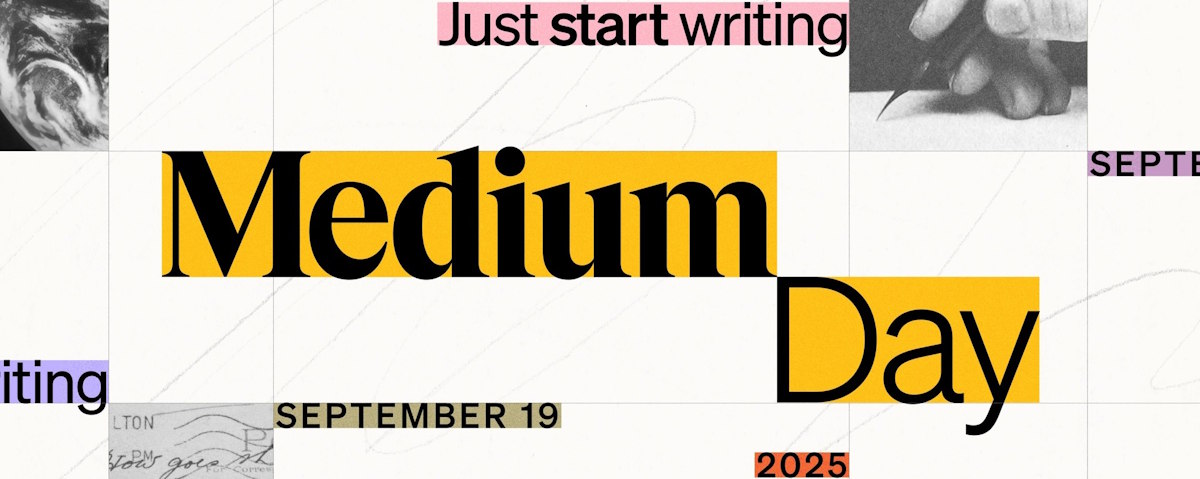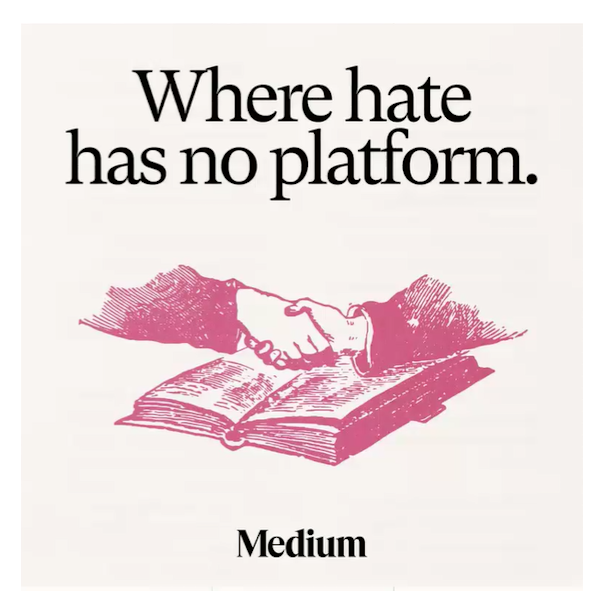I’ve mentioned recently that I was giving Medium another look after being off my radar for several years, and as a result, ended up checking out some of their Medium Day event, which apparently is an annual thing, but this was the first time I’d ever heard of it.
The program was kind of a chaotic combo of SXSW, NaNoWriMo, and a self-publishing unconference — with no obvious indicators of editorial curation beyond Medium’s own sessions; at first glance, at least. There were more than 150 sessions squeezed in a single day, covering an interesting mix of topics with a surprisingly diverse roster of speakers, their main connection apparently being that they all write on Medium?
It’s probably a pretty good indicator of who Medium’s current audience is — committed bloggers and aspiring thought leaders, with some sessions suggesting the usual grifters are in the mix, too — but hints of its full potential were also visible.
Medium Day 2025… briefly
Because it was such a large program and I was unfamiliar with 99% of the speakers (and it was mostly happening during work hours), the session titles had to do a lot of heavy lifting and there were only a few that caught my attention as relevant or potentially interesting.
(Zoom’s Events platform really wasn’t ideal for a program this big, but I’m not sure any other platform I’ve used before would have been able to handle it, either. They really should have had an external schedule of their own to make it easier to browse, which is how I’ve handled events like these in the past.)
Practicing the Law of Two Feet, I bounced out of the first two sessions I picked within 10 minutes. One presenter was literally reading their blog post, which they were also sharing onscreen, so I just found it on Medium and bookmarked it to read later. The other one was a stronger speaker, but while checking out their Medium profile during the intro, I saw way too many posts about AI, each embellished with images created with and unironically credited to Midjourney. That didn’t bode well, so I bounced.
Sadly, both speakers had good energy and didn’t seem like grifters — two critical things too many events still get wrong — so it actually made leaving their sessions feel worse. Fortunately, no one sees you leave the room in a virtual event!
The biggest downside of the Law of Two Feet is you potentially miss the opening of a better session, and that’s what happened with Carin-Isabel Knoop’s insightful “Should I Draw The Line?” Trading Words For Comics In Case Studies, which I really enjoyed. There’s also a related blog post, but she wasn’t just reading it to attendees, and her Q&A was interesting, too, so I’ll definitely go back to watch the part I missed soon. I’m also following her on Medium now, which is surely one of the metrics Medium (or at least some of the presenters) will be tracking to measure the success of the event.
There’s one other session that caught my attention, but it was starting while I was in the middle of writing this, so I’ll probably catch it on-demand because they’re the only non-Medium staff I’m already familiar with — I’m currently in the middle of reading their book.
Overall, if you’re remotely curious, I’d encourage you to scroll through the sessions and watch any that catch your eye on-demand. If nothing else, you might find a writer you like and have a new addition to your own Medium feed!
Who is Medium For?
Interestingly, the two best sessions I attended were about Medium itself, and they were very enlightening: the keynote, Writing is for Everyone, and Medium for Marketers and Communicators.
Writing is for Everyone was a tag team session that basically attempted to answer two of my biggest questions: who is Medium for these days, and how is it different from its previous incarnations?
Two particular moments stood out, both from Scott Lamb, Medium’s VP of Content.
First, Lamb says “user-generated content” is a “gross” term (which I totally agree with) and that he doesn’t like using it in reference to Medium. He proposes using “experience-created content” instead.
O_0
While UGC has always been a gross, reductive corporate term meant to dehumanize and devalue creative activities and skill, ECC is a classic galaxy brain move, trying way too hard to do the right thing, but still buys into the devaluation of creative production by calling it “content”.
A few minutes later, he reveals Medium’s BHAG: “Our goal is to help get the next billion people writing.”
Writing. Not producing or generating “experience-created content.” Writing.
Keep it simple, Scott!
(Surprisingly, whomever runs Medium’s Mastodon account agreed.)
The other good session was Amy Widdowson’s Medium for Marketers and Communicators. Widdowson is Medium’s VP of Communications, and few people embody their title as well as she does, because she made a really compelling case explaining who Medium is for, and more importantly, who it isn’t for.
I particularly appreciated this part:
Medium is for H.U.M.A.N.s
H — Hacks don’t work
U — Use your own words
M — Make an effort
A — Authentic engagement only
N — No exceptions
Although she was explicitly talking to the thought leadership segment of Medium’s billion writers and offered solid advice, a lot of her insights would also be helpful to anyone trying to figure out if Medium is the right platform for them. If you’re reading this on MY blog and you only watch one session, this is the one I’d recommend.
They’re not really a Substack or Ghost alternative, especially if email lists and direct payments are what you’re really looking for — or already have. They’re not really a WordPress or Squarespace alternative if you also need a formal website. And they’re not even a Twitter or LinkedIn alternative because the social angle, while important, is very different.
Medium is basically a very good, purpose-built blogging platform, which is something worth appreciating in 2025.
Blogging isn’t dead, and Medium is layering on human-mediated community and discovery features that are designed to help writers reach more readers. It’s kind of a fancy LiveJournal / Reddit mash-up for people who want to write (and read) longer posts about things they’re specifically interested in, with a (theoretically) higher signal-to-noise ratio?
More importantly, they talk a really good game about wanting to support and nurture writers of all types, and they seem to slowly be working towards putting those words into action.
Kudos in particular to Widdowson, presumably, for ensuring every staff member sang from the same songbook, but each in their own unique voices. Their earnestness definitely makes their mission more believable.
but… Can Medium Succeed This Time?
“Our goal is to help get the next billion people writing.” Scott Lamb
“Tell your story. Reach your readers. Repeat.” Zulie Raine
“Every one of you is a writer, and every one of you has a story to tell.” Tony Stubblebine
“We want you to write the moment you sign up for Medium because we believe that everybody has a story to tell and that’s what the product is designed to do.” Amy Widdowson
Medium has had several well-documented pivots over the years, and Stubblebine was remarkably candid about how they recently dug themselves out of a hole.
Will it be different this time?
That’s the billion-dollar question, I guess. It’s also apparently the billion-writer question.
Medium’s core pitch is heavily mission-driven, creating a big tent for a wide range of writers and writing goals — but it’s tied to a BHAG that reminds you of their origination and very troubled history.
Scale is clearly still a KPI, and one Billion is a very big number. One Billion NEW writers is a mind-bogglingly big number.
Interestingly, Widdowson made a firm point about saying Medium is a subscription-based company, and there are no ads. That means readers are at least as important as writers, and while many of the latter may only have one story to tell, Medium is clearly banking on their willingness to engage with and support the smaller subset of writers who have more to say.
(She also didn’t say there’d NEVER be ads. In a world that’s seen premium streamers fully embrace ad-supported TV and Samsung is now putting ads on people’s refrigerators, advertising on a media platform is basically Thanos.)
Their biggest challenge will be whether or not they can equitably support the very different types of writers a big tent will attract, and how clear their editorial perspective is for determining the “best” writing they’ll explicitly support to ensure their best writers keep writing, and their readers keep subscribing.
It’s literally the old school magazine model, but at a bigger scale and without the advertising to support (or justify) it. For now.
Churn is also a KPI.
From my perspective over the past couple of months engaging as a reader, it’s been a very mixed bag, and they clearly have a lot of work to do. There’s a strong LinkedIn influencer vibe to a lot of what I’ve seen surfaced for me, and the most intriguing headlines lead to the paywall I haven’t been convinced is worth getting past yet.
For writers, I think there’s an interesting opportunity for two types:
- Aspiring thought leaders, especially those tired of LinkedIn’s algorithm and/or their own company’s website.
- Aspiring writers in general who don’t have a notable online presence for their writing yet, and monetizing their work isn’t a primary goal.
With modest expectations and a clear understanding of what they mean by H.U.M.A.N.s, I can see it being worth considering for these specific writers. In both scenarios, I think Medium actually can make more sense than paying for Ghost (with your money), Substack (with your credibility), or WordPress (with your time) — especially if you have no interest in, or need for, owning your own domain.
Are there really one Billion of these writers, though?
NOTE: I still don’t quite get the Publications angle on Medium, and finding them hasn’t been the most intuitive process, but they’re still clearly a core feature that has some potential. Based on past history, I’d remain leery of starting one, but submitting individual articles to existing ones that align with your writing might make sense to expand your reach.
PS: I’ve cross-posted this to Medium, too; curious to see what kind of engagement it gets there.
Do you like email?
Sign up here to get my bi-weekly "newsletter" and/or receive every new blog post delivered right to your inbox. (Burner emails are fine. I get it!)




In the coming robot-controlled future, perhaps Medium will become the source of the H.U.M.A.N. resistance.
I’m curious to see how they navigate “AI” integration, especially with their new tool, TK, but I’m cautiously optimistic that they can be a relatively “good” platform as so many others pivot towards bad.